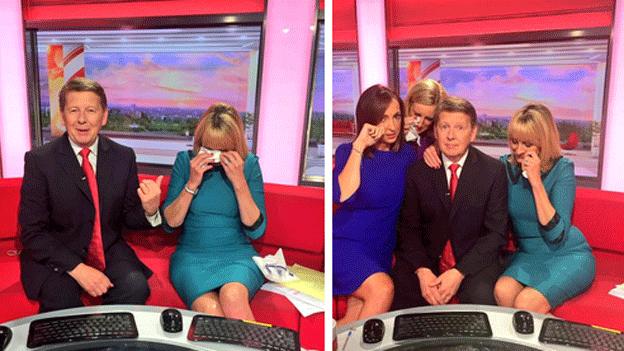BBC Breakfast's Bill Turnbull on early starts and tricky guests
- Published
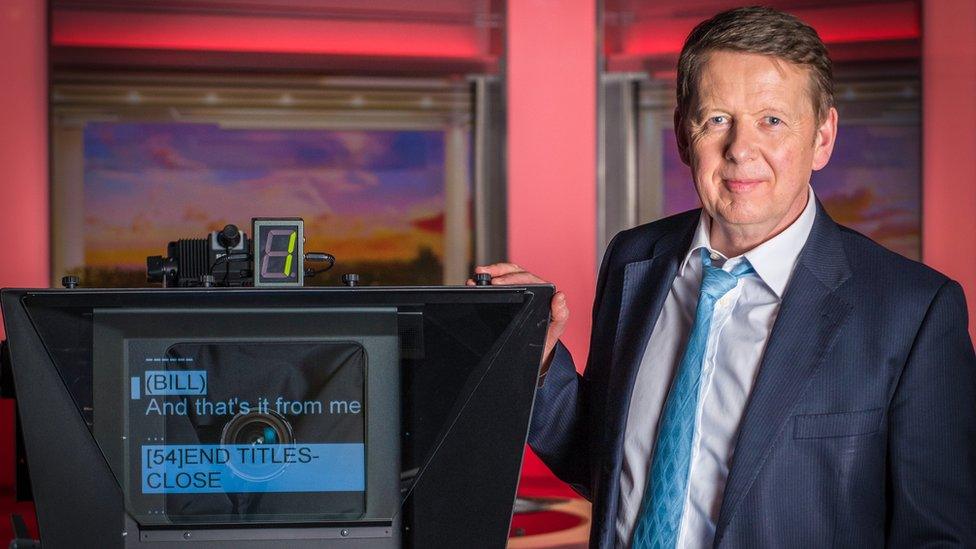
"I used to feel permanently jetlagged" - Bill Turnbull on the early starts
Bill Turnbull has spent the past 15 years as one of the faces of BBC Breakfast - but is now leaving the famous red sofa. To mark his last day, he has been talking about early mornings, meeting his idols and dealing with difficult interviewees.
Turnbull worked as a foreign news correspondent before joining Breakfast in 2001. He became one of the main weekday hosts in 2008 and moved with the programme from London to Salford in 2012.

Why are you leaving Breakfast?
I have been presenting the programme for 15 years, and I think getting up at 3:30 does take its toll after a while. And I want to seek fresh fields while I still can.
The programme's in really good shape so I don't feel any guilt about leaving it behind because it's in very good hands.
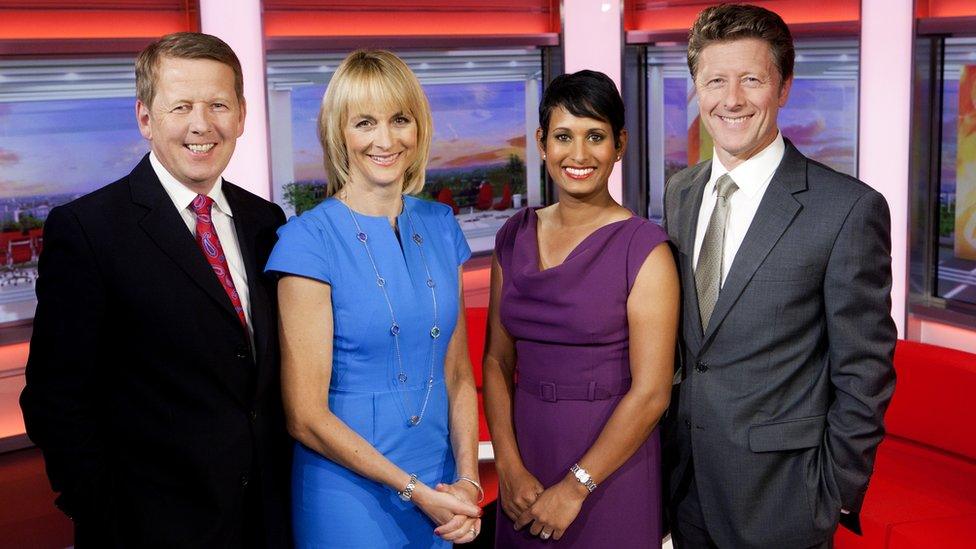
Turnbull shared hosting duties with with co-hosts Louise Minchin, Naga Munchetty and Charlie Stayt
Have you been in a different time zone to the rest of us for the last 15 years?
The week is split into two halves. You start on Sunday and think about the next day's show, get up early for it, do the programme, go home, have a nap, get up, do one or two other things and then start thinking about the next day's programme. That goes on until Wednesday.
When we did four days a week in London I used to feel permanently jetlagged because you never really got back to normal. Since we came up here, it's been easier because there's one less day to get tired and one more day to recover.
What time do you go to bed?
The days I'm working, I go to bed at 9:30 - or try to. And then the alarm goes at 3:30. I get up, get ready, do 10 minutes of yoga just to keep everything moving.
Then I leave home at 4:20, get in at 5:00. Then we're on air at 6:00. And then when I've finished the programme I go home and have a nap for an hour and a half. A lot of the job is about sleep management - making sure you get enough and you can function.
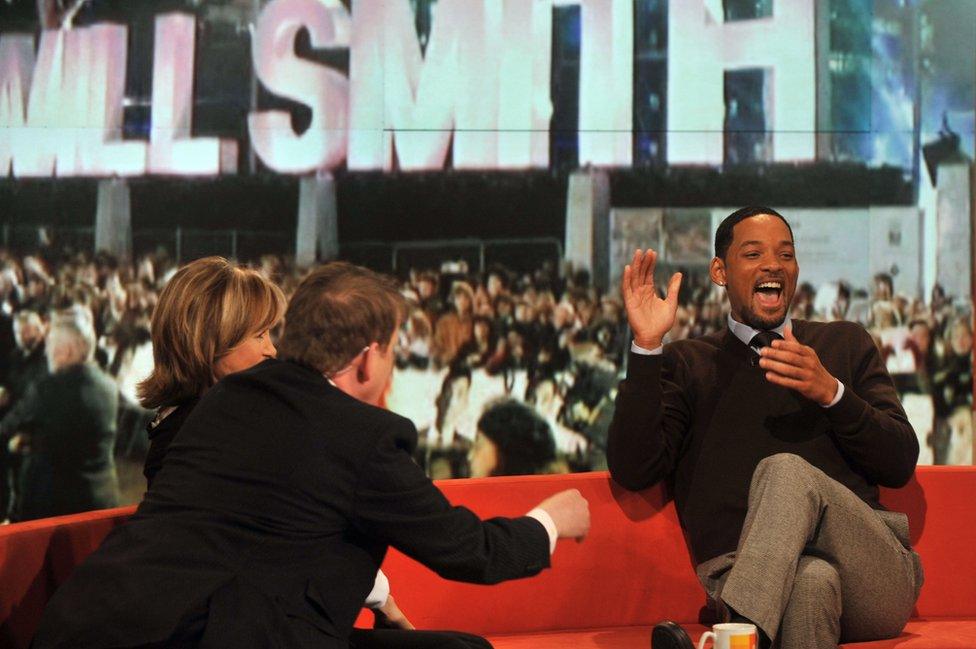
Will Smith appeared on Breakfast in 2009
Who were your favourite guests?
The ones I remember are the ones who were personal favourites before the interviews. So I remember meeting Eric Burdon, who was an idol of mine when I was younger, and David Byrne, who'd been in Talking Heads. I got to hold Jimi Hendrix's guitar once on air, which was a great thrill.
There was Will Smith, who I'd met a couple of times before and then he came in live and we gave him a 15-minute slot, which we'd never done before. There have been so many famous faces on the sofa - I sometimes get confused as to who I've met and who I haven't.
What about the worst interviews?
The bad ones I tend to wipe from my mind. There have been one or two. Funnily enough if I think a guest is going to be difficult they often turn out to be quite rewarding, and it's the interviews sometimes that you think are going to be a dream that turn out to be a bit difficult.
There was one instance where we had a singer, and 20 seconds before we went on air I was barking at his manager to get out of the studio because he was standing literally behind the sofa remonstrating with us about a question we wanted to ask. Which we then did go on to ask.
That was one of the most difficult moments we've had because then it made for a rather fraught atmosphere. He apologised profusely afterwards. Naming no names. Tom Odell.
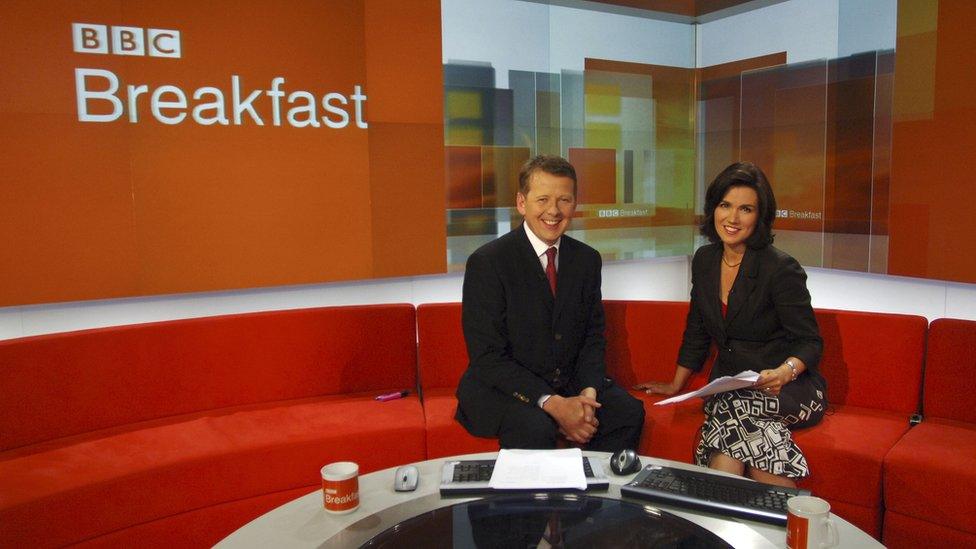
Turnbull teamed up with Susanna Reid before her departure for ITV
Have you had a favourite co-presenter?
I've worked with 14 or 15 different people on the sofa and got on pretty well with all of them. Sian [Williams] was my longest-running partner and we worked together very well.
I used to love working with Mishal Husain because she'd bring me chocolate biscuits every Friday. And working with Susanna [Reid] was also very important because we were together when we moved up here. She worked so hard to make it work in the sense that she was still down in London with her kids and would go down by train every day and come back up. Her dedication was phenomenal.
And working with Louise [Minchin] over the last couple of years has been terrific as well. She and I have a special bond because we went around the world in 80 days. We'll always have Ulan Bator.
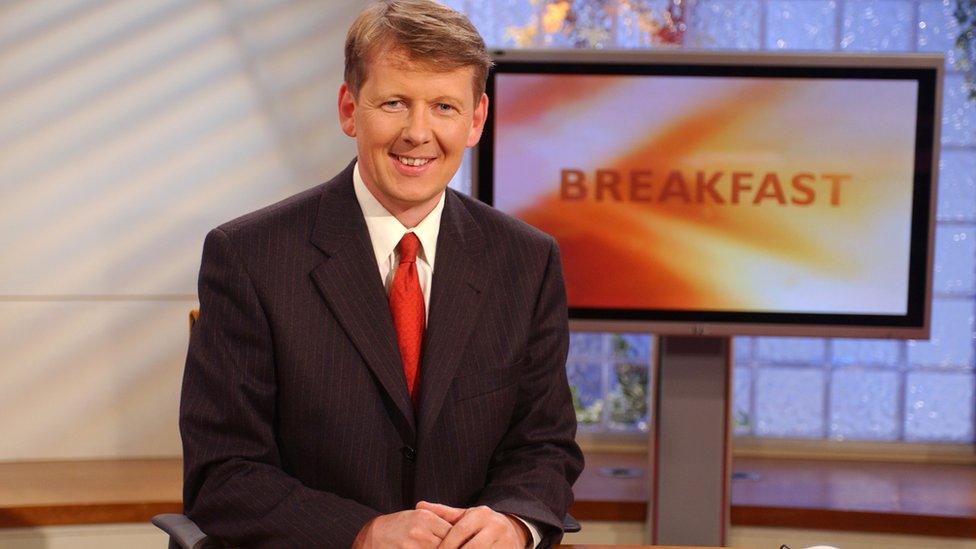
Turnbull says the programme was "a little bit dull" when he joined
Has the programme changed since you started?
Yes, enormously. When I first joined, it was rather staid and to be honest a little bit dull. Part of the success of the programme was it learned to relax, not just in terms of the presentation but also in terms of the content. That plus the advent of the sofa as a brand.
In the old days, we'd be behind a desk for two hours, then only do the last half hour from a sofa. Then we went through various different versions of it - we had a period when we shifted between desk and sofa every half hour, which was exhausting and confusing for everybody.
Once we decided we were going to be on the sofa for the entire programme then everything really settled down and the sofa is the star of the show.
How has the programme changed after moving to Salford?
I think it's given us a wider view of Britain. There was a danger that when we were in London we were a bit hamstrung by seeing the rest of Britain as being more distant and "out there".
Now we are "out there" and it's much easier for us to see and appreciate what's happening in different parts of Britain. We don't just have a north-west view - we have a greater overall view of what's going on and I think it's been very healthy. And we've kept the momentum. I think we've got a new energy from moving up here.
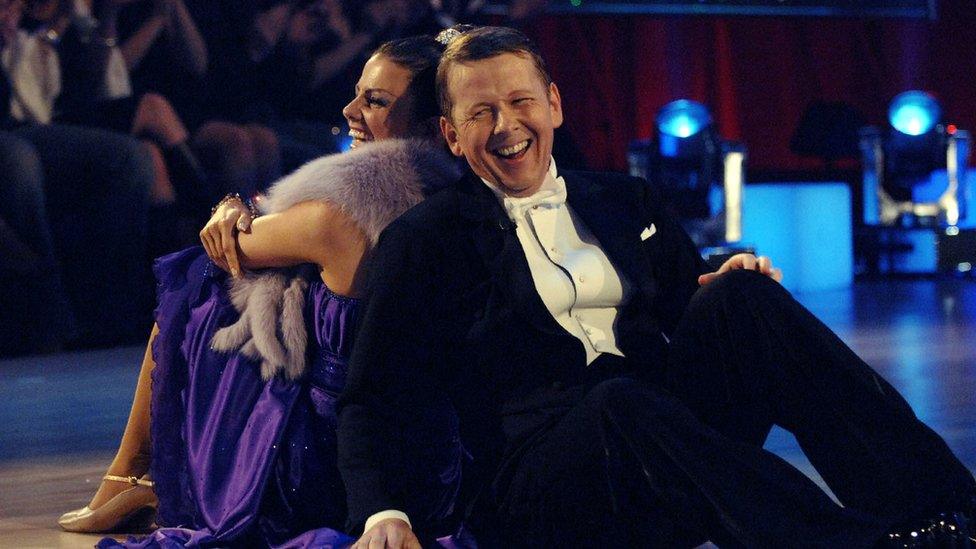
Turnbull danced with Karen Hardy on Strictly Come Dancing in 2005
What next for you?
I'm presenting a quiz show called Think Tank, which is going out on BBC One in the Spring. I'll also be trying to do a bit of writing and one or two other projects are kicking around - some in radio, some in TV, so I intend to keep myself pretty busy.
You also do online commentary for Wycombe Wanderers. Were you tempted to move to 5 live and take up football commentary?
I was - I'm just waiting for the phone to ring! To be honest my commentary skills are not necessarily worthy of 5 live. I'd describe myself less as a commentator and more as a fan with a microphone. I've learned just to say that there's been a goal scored without trying to identify the scorer immediately because I'm usually wrong.
What advice would you give your successor?
Try to enjoy it, because if you can enjoy presenting the programme it means you're relaxed and the audience will relax with you.
If there's a good atmosphere in the studio that makes people feel good about watching. They can detect tension, particularly between presenters, at a thousand paces, and viewers don't like it.
Bill Turnbull was speaking to entertainment reporter Ian Youngs.
- Published9 February 2016
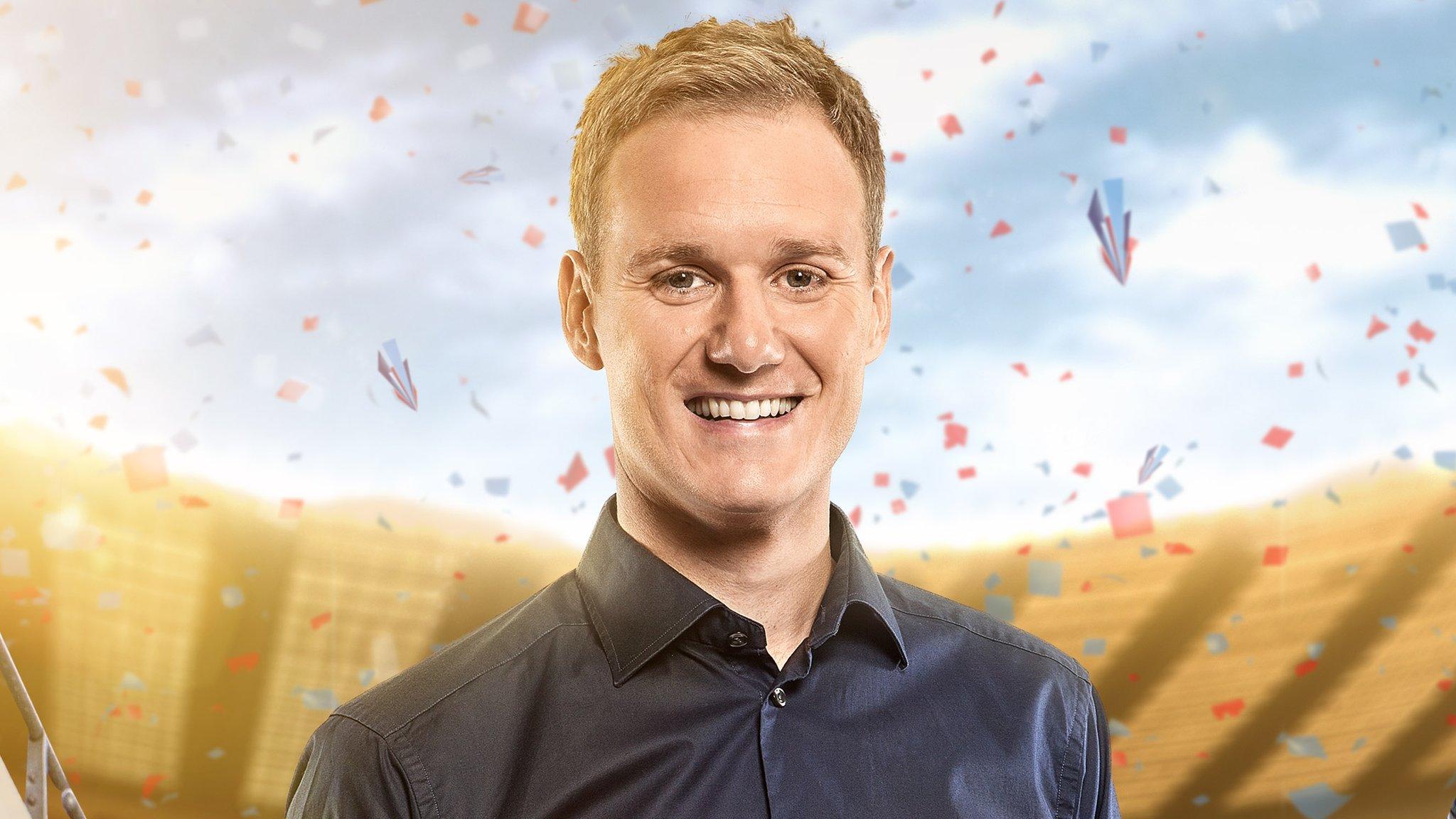
- Published2 September 2015
